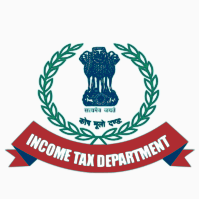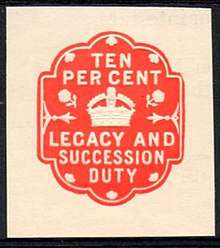Income Tax Department
 | |
| Agency overview | |
|---|---|
| Formed | 1922 |
| Jurisdiction | Government of India |
| Employees | 46,000 (2016-17 est.)[1] |
| Minister responsible | |
| Agency executive |
|
| Parent department | Department of Revenue |
| Website |
incometaxindia |
The Income Tax Department, also referred to as IT Department, is a government agency in charge of monitoring the income tax collection by the Government of India. It functions under the Department of Revenue of the Ministry of Finance.[2] It is responsible for administering following direct taxation acts passed by Parliament of India.[3]
- The Income-tax Act, 1961
- Expenditure Tax Act, 1987
- Various Finance Acts (Passed Every Year in Budget Session)
The IT Department is also responsible for enforcing the Double Taxation Avoidance Agreements and deals with various aspects of international taxation such as Transfer pricing. Finance Act, 2012 seeks to grant Income Tax Department powers to combat aggressive Tax avoidance by enforcing General Anti Avoidance Rules.[4]
Management
The Central Board of Direct Taxes (CBDT) is a part of Department of Revenue in the Ministry of Finance. The CBDT provides inputs for policy and planning of direct taxes in India, and is also responsible for administration of direct tax laws through the IT Department. The CBDT is a statutory authority functioning under the Central Board of Revenue Act, 1963. The officials of the Board in their ex officio capacity also function as a division of the Ministry dealing with matters relating to levy and collection of direct taxes. The CBDT is headed by Chairman and also comprises six members, all of whom are ex officio Special Secretary to the Government of India.
The Chairman and members of the CBDT are selected from the Indian Revenue Service (IRS), whose members constitute the top management of the IT Department. The Chairman and every member of CBDT are responsible for exercising supervisory control over definite areas of field offices of IT Department, known as Zones. Various functions and responsibilities of the CBDT are distributed amongst Chairman and six members, with only fundamental issues reserved for collective decision by the CBDT. The areas for collective decision by the CBDT include policy regarding discharge of statutory functions of the CBDT and of the Union Government under the various direct tax laws. They also include general policy relating to:
- Set up and structure of Income Tax Department;
- Methods and procedures of work of the CBDT;
- Measures for disposal of assessments, collection of taxes, prevention and detection of tax evasion and tax avoidance;
- Recruitment, training and all other matters relating to service conditions and career prospects of all personnel of the Income-tax Department;
- Laying down of targets and fixing of priorities for disposal of assessments and collection of taxes and other related matters;
- Write off of tax demand exceeding Rs.25 lakhs in each case;
- Policy regarding grant of rewards and appreciation certificates.
Any other matter, which the Chairman or any Member of the Board, with the approval of the Chairman, may refer for joint consideration of the Board.[5] The powers of Tax Recovery Officers (TROs) were increased by Government of India in June 2016.[6]
Anti Black Money Measures
The Finance Ministry instructed all revenue intelligence agencies to join the crackdown on forex traders, hawala operators and jewellers besides tracking movement of demonetised currency notes.[7]
Income Tax departments raided various illegal tax-evasive businesses in Delhi, Mumbai, Chandigarh, Ludhiana and other cities that traded with demonetised currency.[8] The Enforcement Directorate issued several FEMA notices to forex and gold traders.[7] Large sum of cash in defunct notes were seized in different parts of the country.[9][10][11][12][13] In Chhattisgarh liquid cash worth of ₹4.4 million (US$61,000) was seized.[14]
- In 2016, December the Income Tax department,received more than 4000 emails, on black money holders, in India, within 3 days, when Income Tax Department, issued in public notice an email to report black money[15]
Seizures of new Rs. 2000 notes
Huge amounts of cash in the form of new notes were seized all over the country after the demonetisation.[16][17]
In December 2016, over 4 crore in new Rs. 2000 notes were seized from four persons in Bangalore,[18][19][20] Rs 33 lakh in Rs. 2000 notes were recovered from Manish Sharma, an expelled BJP leader in West Bengal,[21][22] and Rs. 1.5 crore was seized in Goa.[23] 900 notes of the new Rs. 2000 denomination were seized from a BJP leader in Tamil Nadu.[24] Around Rs. 10 crore in new notes were seized in Chennai.[25]
As of 10 December, Rs. 242 crore in new notes had been seized.[26]
It was announced by the government that the seized notes will be brought into the mainstream as soon as possible to ease out the cash problem.
See also
References
- ↑ "Central govt to hire 2.8 lakh more staff, police, I-T & customs to get lion's share - Times of India".
- ↑ "Question Bank". Incometaxindia.gov.in. 2009-03-31.
- ↑ "Home - Central Board of Direct Taxes, Government of India". www.incometaxindia.gov.in.
- ↑ "Union Budget 2012: GAAR empowers I-T department to deny tax benefits to 'companies'", The Times Of India, 2012-03-16
- ↑ "Information to be published under section 4(1)(b) of the Right to Information Act, 2005" (PDF). Central Board of Direct Taxes, Government of India. 10 December 2014.

- ↑ "Wilful defaulters: I-T dept to use powers to arrest, detain", The Economic Times, 21 June 2016
- 1 2 "Enforcement Directorate issues FEMA notices to forex, gold traders". The Economic Times. Retrieved 16 November 2016.
- ↑ Rai, Arpan (11 November 2016). "Income tax dept conducts raids across India as illegal financial institutions crop up; shops call it a day". India Today. Retrieved 12 November 2016.
- ↑ "Rs. 13.22 lakh in cash seized". The Hindu. 11 November 2016.
- ↑ "Rs 4 Crore-Worth Scrapped Notes Seized From Maharashtra Trader".
- ↑ "Rs 76 lakh cash seized from vehicle in Mandi – Times of India".
- ↑ "Madhya Pradesh: Rs 4 crore-worth scrapped bank notes seized from trader". 12 November 2016.
- ↑ "Rs. 73 lakh cash seized from two cars near Nashik". Retrieved 2 December 2016.
- ↑ "Chhattisgarh: Cash worth Rs 44 lakhs in Rs 500, Rs 1000 notes seized from a man". Daily News & Analysis. 11 November 2016.
- ↑ "Black money, informers crosses 4000". 20 December 2016.
- ↑ "Rs 111.3 crore and counting: Here is a conservative list of new cash seizures reported post-demonetisation". 10 December 2016.
- ↑ "I-T department seizes Rs 130 crore cash, jewellery post demonetisation". 6 December 2016.
- ↑ "New notes worth Rs 4.7 crore seized in I-T raids in Bengaluru - Times of India".
- ↑ "Bengaluru: In Indias biggest seizure since Nov 8, Rs 5.7 crore found - all in new Rs 2000 notes".
- ↑ "Bengaluru: Rs 2000 notes worth over Rs 4 crore seized by Income Tax dept". 1 December 2016.
- ↑ "After BJP leader Manish Kumar's arrest, Babul Supriyo washes hands off all linkages, calls it 'wasted time'". 7 December 2016.
- ↑ Team, BS Web (7 December 2016). "Several BJP men caught with crores; Karnataka biggest hotspot for illegal cash transactions" – via Business Standard.
- ↑ IANS. "Demonetisation: Rs 1.5 crore in new Rs 2,000 notes seized in Goa, two held".
- ↑ "Over 900 new Rs 2000 notes seized from TN BJP leader who backed demonetisation". 2 December 2016.
- ↑ "Biggest seizure of Rs 142 cr cash, gold post demonetisation". Deccan Herald.
- ↑ "Cash crunch? Rs 242 crore in new currency seized after demonetisation". 9 December 2016.
